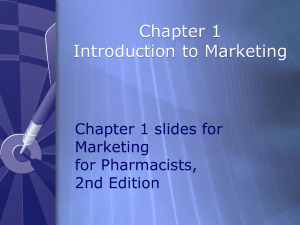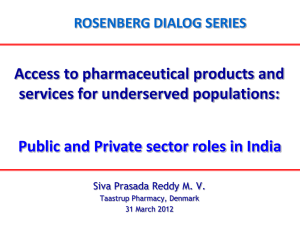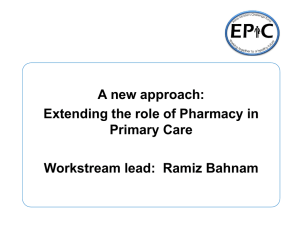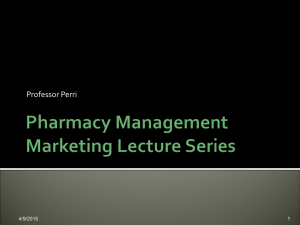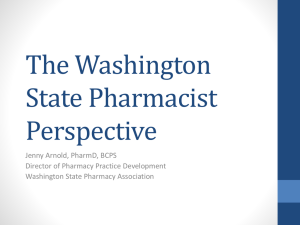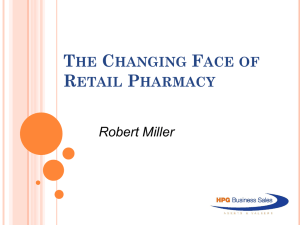FAQs for JC students opting for Pharmacy Course
advertisement
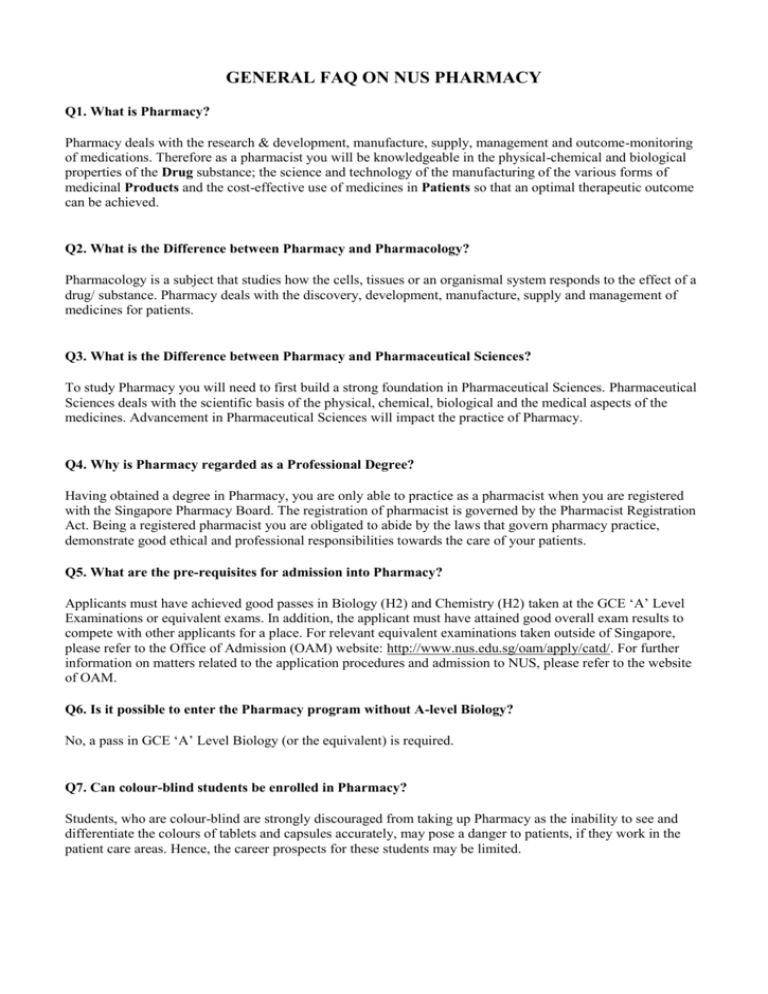
GENERAL FAQ ON NUS PHARMACY Q1. What is Pharmacy? Pharmacy deals with the research & development, manufacture, supply, management and outcome-monitoring of medications. Therefore as a pharmacist you will be knowledgeable in the physical-chemical and biological properties of the Drug substance; the science and technology of the manufacturing of the various forms of medicinal Products and the cost-effective use of medicines in Patients so that an optimal therapeutic outcome can be achieved. Q2. What is the Difference between Pharmacy and Pharmacology? Pharmacology is a subject that studies how the cells, tissues or an organismal system responds to the effect of a drug/ substance. Pharmacy deals with the discovery, development, manufacture, supply and management of medicines for patients. Q3. What is the Difference between Pharmacy and Pharmaceutical Sciences? To study Pharmacy you will need to first build a strong foundation in Pharmaceutical Sciences. Pharmaceutical Sciences deals with the scientific basis of the physical, chemical, biological and the medical aspects of the medicines. Advancement in Pharmaceutical Sciences will impact the practice of Pharmacy. Q4. Why is Pharmacy regarded as a Professional Degree? Having obtained a degree in Pharmacy, you are only able to practice as a pharmacist when you are registered with the Singapore Pharmacy Board. The registration of pharmacist is governed by the Pharmacist Registration Act. Being a registered pharmacist you are obligated to abide by the laws that govern pharmacy practice, demonstrate good ethical and professional responsibilities towards the care of your patients. Q5. What are the pre-requisites for admission into Pharmacy? Applicants must have achieved good passes in Biology (H2) and Chemistry (H2) taken at the GCE ‘A’ Level Examinations or equivalent exams. In addition, the applicant must have attained good overall exam results to compete with other applicants for a place. For relevant equivalent examinations taken outside of Singapore, please refer to the Office of Admission (OAM) website: http://www.nus.edu.sg/oam/apply/catd/. For further information on matters related to the application procedures and admission to NUS, please refer to the website of OAM. Q6. Is it possible to enter the Pharmacy program without A-level Biology? No, a pass in GCE ‘A’ Level Biology (or the equivalent) is required. Q7. Can colour-blind students be enrolled in Pharmacy? Students, who are colour-blind are strongly discouraged from taking up Pharmacy as the inability to see and differentiate the colours of tablets and capsules accurately, may pose a danger to patients, if they work in the patient care areas. Hence, the career prospects for these students may be limited. Q8. What is the Course Duration? The Pharmacy course is a 4-year professional programme and students are admitted directly into Pharmacy in the first year of study. At the end of the 4 years, graduates are conferred the degree of B.Sc (Pharm), while those who have demonstrated good academic performance over the 4 years will be awarded B.Sc (Pharm) Hons degrees. Graduates with a Pharmacy degree may be registered with the Singapore Pharmacy Board upon the completion of a 1 year pre-registration training. Q9. What is the Course Structure like? The 4-year degree course consists of lectures, tutorials, practicals and two 6-week attachments (preceptorship programme) in the Community and Hospital Pharmacies in the 2nd and 3rd year respectively. Q10. What are the Career Prospects for Pharmacy graduates? Career opportunities for pharmacists are abundant and diversified. There are two broad areas of practice, namely patient care practice and non patient care practice. Depending on your interests and capabilities, you may develop your career in either area. As a registered pharmacist, you may manage and supply medications for patients in hospitals, community pharmacies or polyclinics. In the hospitals, you may choose to develop your clinical pharmacy skills further and focus on caring for specialized groups of patients (eg. cancer patients, patients in intensive care, diabetic patients, geriatric patients, patients on anticoagulants etc.) In the community and polyclinic pharmacies, you will provide primary healthcare for your patients. Alternatively, those who wish to enter the pharmaceutical industry immediately upon graduation may also do so without completing the pre-registration training. Your strong foundation in Pharmaceutical Sciences will lead you to various opportunities in the fast-paced and dynamic pharmaceutical industry. There are plenty of opportunities for pharmacy graduates in the pharmaceutical industry and these include pharmaceutical manufacturing, product registration, product development, sales and marketing of pharmaceuticals and clinical trials. FAQs for JC students opting for Pharmacy Course Is Pharmacy for You? Top Ten Reasons to Become a Pharmacist http://www.aacp.org/site/page.asp?TRACKID=&VID=1&CID=686&DID=4740 Provided by the American Association of Colleges of Pharmacy 1. I Want to Help People Get Well Pharmacists play a key role in helping patients feel better and get well as quickly as possible. Pharmacists can be instrumental in improving the health of patients by choosing the best medicines and helping to avoid side effects. There are often multiple medications available on the market to treat a single disease or ailment. Pharmacists work with prescribers to determine the best drug- and non-drug therapy for a patient’s particular illness, age, gender, health, etc. Pharmacists screen patients for drug allergies and adverse drug effects. 2. I Like to Work Directly with Patients Since pharmacies are often located within a residential community and in common shopping places like grocery stores, pharmacists are generally considered the most accessible member of the health care team. Patients can often visit their local pharmacist to seek advice about the medications they are taking without making an appointment. Pharmacists may also provide other services such as immunizations, asthma care, blood pressure monitoring services, cholesterol screening, diabetes disease management, smoking cessation consultation, bone density scans for osteoporosis screening, anticoagulation management clinics, and more. 3. I Enjoy a Wide Variety of Career Opportunities Pharmacists can work in a myriad of professional settings. The majority of pharmacists (60%) works in an independent or retail chain community pharmacy and provides counseling to patients on the use of prescription and over-the-counter (OTC) medications. Pharmacists work in numerous other health care environments as well, including hospitals, nursing homes, managed care organizations, the pharmaceutical industry, colleges and schools, and the federal government. Pharmacists play key leadership roles in all aspects of the health care system. 4. I Can Benefit from the Increased Demand For Pharmacists There is an ongoing demand for pharmacy services in most sectors of the profession. The demand is fueled by the following factors: Increased demand for patient services. Pharmacists are able to work in a wider array of practice settings and positions than ever before. Increase in number of prescriptions filled each year. Our society will continue to need more pharmacists to fill the growing number of prescriptions as more medicines become available and the population ages. Increase in the number of medicines available on the market. There is a greater selection of prescription and OTC drugs manufactured today than in the past. Multiple medications are often available to treat a single disease. Pharmacists help prescribers and patients decide which medicine will have the most beneficial results. There is a greater selection of prescription and OTC drugs manufactured today than in the past. Multiple medications are often available to treat a single disease. Pharmacists help prescribers and patients decide which medicine will have the most beneficial results. Increase in the elderly population. Older patients generally have more chronic illness and more complicated drug regimens than younger individuals. Pharmacists play a key role in helping the elderly patients navigate complicated medication requirements and explore ways to minimize their financial burden. The aging population has also increased the need for long-term care, geriatric, and consultant pharmacists. 5. I Want to be an Important Member of the Health Care Team Pharmacists work with other health care professionals to maximize health outcomes. Numerous studies have proven that the presence of a pharmacist on hospital rounds as a full member of the patient care team has been shown to prevent drug errors and reduce costs. The collaboration of health care professionals, such as physicians and pharmacists, can help to ensure that patients properly take their medications as prescribed and avoid any harmful drug interactions. 6. I Can Have Job Mobility, Stability, and Flexibility Pharmacists may be able to establish non-traditional or part-time work hours, depending on the practice setting. With the shortage of pharmacists, pharmacy students often receive multiple job offers prior to graduation. 7. I am Excited to be a Part of Major Innovations in Drug Therapy One of the many exciting developments in the pharmacy profession is the growth of a discipline, known as pharmacogenomics. Genetic variations in genes can affect a body’s response to a drug. In the future, specialists in this area hope to sequence the entire human gene in each individual. Pharmacists and other health care providers will be able to use that information to select the best medicines, treat diseases earlier than now possible, or prevent them entirely with individually-tailored drug therapies. 8. I Want to Work with State-of-the-Art Technology Digital innovations in pharmacy include electronic prescriptions, robotics for central prescription processing and use of computers in practice as well as pharmaceutical research. These technological advances enhance efficiency and help to promote patient safety. Pharmacists use these same tools to help prioritize work, fill prescriptions with greater accuracy, and spend more time with patients. By law, pharmacists must oversee an automated dispensing process for quality control purposes. 9. I Can Help Defend Against Bioterrorism Pharmacists are educated to recognize signs and symptoms of diseases that may be used in a biological attack. The accessibility of pharmacies could be one of the keys to a successful mass immunization or drug distribution program in an emergency. In an epidemic or bioterror situation, pharmacists are prepared to play a major role in preventing the spread of disease and overseeing the distribution of appropriate and safe medications. 10. I Would Like to Be a Highly Respected Member of My Community According to a November 2003 Gallup Poll, pharmacists’ honesty and ethics were rated as "high" or "very high" by 67% of Americans, and surpassed in ranking only by nurses. Pharmacists are visible leaders in our community who are entrusted with the health of our families. Everyone's reason for considering pharmacy is different. No one reason is more valid than another as long as the job is fulfilling. Another Top 10 Reasons are: 1. I enjoy chemistry and/or biology 2. I've seen the benefit of drug therapy in my own family 3. I've seen how drugs can cause problems if not monitored by a caring professional. 4. I like to work with people 5. I like to work with doctors and/or nurses 6. Pharmacy is a very flexible program with multiple career options 7. The salary is good 8. I can move anywhere and find a pharmacy position 9. Pharmacy is one of the few health care professions where a pharmacist can practice full or part-time. 10. My Mom or Dad wants me to be a pharmacist. What Does It Take To Be A Good Pharmacist http://www.uspharmd.com/rxpharmacist.htm To be a good pharmacist: ♦ You should have a good memory and enjoy learning about new medicines and treatments ♦ You should also be trustworthy and detail-oriented and have good communication skills. ♦ Also, you should have good problem solving abilities to help or guide patients through proper medication regiment or treatment. PHARMACIST CAREER MATCHING MATRIX PROS: Good salaries Wide variety of career options Life-long learning CONS: Long hours Potential restlessness PERSONALITY MATCHES: Analytical Detail Focused Creative PERSONALITY MISSES: Emotional Disorganized The Most Trusted Profession: No. 2 in Year 2000 Gallup Poll http://www.uspharmd.com/rxstudent.htm 1. (79%) Nurses 2. (67%) Pharmacists 3. (66%) Veterinarians 4. (63%) Medical doctors 5. (62%) Grade & high school teachers 6. (60%) Clergy 7. (59%) College teachers 8. (58%) Dentists 9. (56%) Engineers 10. (55%) Policemen Why is the average starting salary for pharmacists in Singapore lower than some other BSc degrees in the employment survey? After graduation, pharmacy students go on to a 9-month pharmacist pre-registration training before getting the professional license and the salary captured is for the duration of the training. Similarly, other professionals such as medical doctors and lawyers are required to undergo some form of training before becoming registered practitioners. As far as grades are concerned, there's not much you can do at this point except to have a good reason if they're very low. Remember that the worst you can hear is "no." That's a lot better than wondering, all your life, if you might have been accepted. Go ahead and select Pharmacy as one of your choices.
